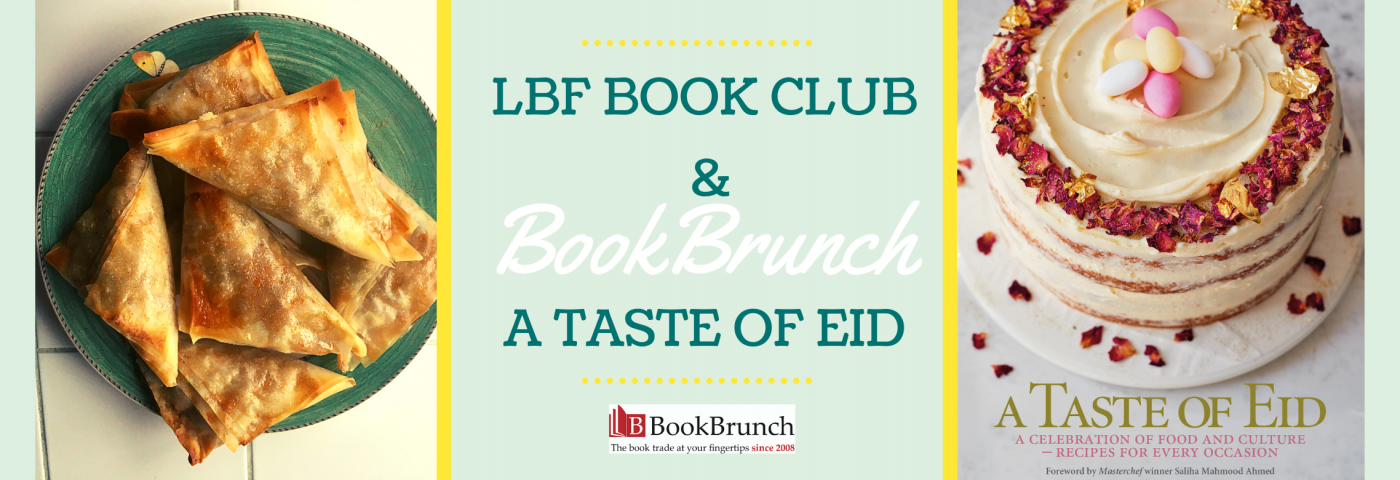A special treat in the LBF Book Club this week as we get ready for the festival of Eid, and discover some of the delicious recipes used to celebrate. As ever our book club is not only designed to bring us together through our shared love of books but also connect us with the greater online publishing community. This review of A Taste of Eid was written by BookBrunch Reporter, Lucy Nathan. Enjoy.
A Taste of Eid, Lucy Nathan, BookBrunch Reporter
As a less-than-talented chef, I was a little apprehensive when A Taste of Eid arrived at my front door. I was lucky enough to get a free copy – I am a reporter at BookBrunch, the team behind the publisher, Brunch Books – and opening it felt like a real treat. I am a better baker than cook, so my instinct was to flip to the back section, where there is a plethora of recipes for sweet treats: truffles scented with fennel, sweets made with pistachio, cranberry and coconut, and a glorious lemon-rose Eid cake that is pride of place on the cover. As someone whose diet growing up consisted mostly of traditionally English beige food, this could have been intimidating, but each recipe is written with enough clarity and detail that they’re incredibly easy to follow.
I make a mean apple pie (one of two recipes I am good at, the other being beans on toast), so I tried out the apple and sultana filo parcels. My kitchen smelled like heaven as the apples, sultanas, cinnamon, cardamom and honey simmered on the hob, and once they were done, the filo parcels tasted even better. Crunchy, crackly pastry, the apple mixture inside warm and sweet and spicy. Despite my limited cooking skills, the apple did not explode out of the pastry in the oven as I had feared, and they tasted magical. The next evening I warmed up the leftover parcels and added vanilla ice cream. Speaking as someone who once burned soup: this recipe is foolproof.
With that little triumph under my belt, I began to explore the rest of the book. I am a vegetarian, which means that a lot of recipe books have sections that I flip through and ignore, but A Taste of Eid has plenty of tasty veggie dishes and sides, from vegetable and oat soup to a mixed vegetable kurma to a vegetable maqluba, which usually contains meat but in this book is made from aubergine, peppers and cauliflower. There are also recipes for dips like hummus and moutabel, along with a wonderful section on breakfast foods. Breakfast is probably my favourite meal of the day and these recipes look glorious: roti with paneer and spinach is something I would quite happily eat every morning for the rest of my life, and I am intrigued by balaleet, which is vermicelli cooked in sugar syrup, flavoured with cinnamon, and then added to a cardamom-scented omelette. I’m not sure that I have ever read a more delicious combination of words before. And a ghotala is a take on scrambled eggs with added onion, ginger, garlic, tomatoes, coriander and a range of other spices and herbs. It – get this – has another egg on top, this time fried. I don’t think there’s any better garnish you could add to eggs than, simply, ‘another egg’. This book knows how to make me happy.
The chicken machboos and the koftat samak – fishcakes – look particularly excellent, even to a vegetarian, but I’ll be happy with the grilled vegetable kebabs: I have been staring at the photograph of them in the book now for an indecently long period of time, and I think they would be perfect paired with the fresh lemonade in the snacks and drinks section of the book.
The recipes in this book are lovely, full of flavours that make me excited to experiment in the kitchen and to try foods and ingredients that are new to me, but what makes them really special is that they look doable. The instructions are clear and simple, and there are suggestions about what other dishes they’d go perfectly with – at the end of the book there are meal ideas, from a family breakfast to a light lunch to an afternoon tea. There’s an introduction from Saliha Mahmood Ahmed, Masterchef winner, in which she explains the two festivals of Eid and the importance of fragrance, an understanding of spice, and a love for fresh herbs and locally sourced ingredients in Islamic culinary traditions. I feel lucky that this book has shared those traditions with me. Alongside the recipes, it contains information about the meaning of Eid, how to lay a table for it, and the traditions surrounding the festivals. It demonstrates that food is not just food: it means love, it means family, it means culture – and no matter your cooking skill or what background you come from, this book will make you feel part of it.

